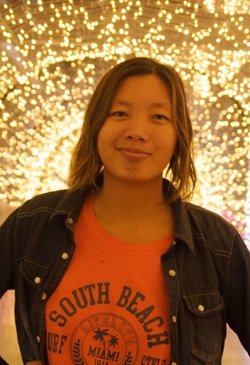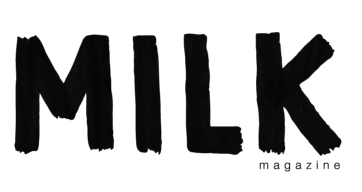| BANYAN BLOG |
banyan blog
"My current life feels special and uniquely mine because I get to be Cambodian-American in both Cambodia and America and I love how complete that makes me feel."  Caylee So, was born in Khao-I-Dang, a refugee camp along the Cambodia-Thai border in 1981. Like many families, Caylee and her family immigrated to the United States to find a better life soon after the fall of the Khmer Rouge regime. Settling down in Northern Virginia, she was a quiet child searching for a sense of place and belonging. At 18 she left home and joined the U.S. Army to explore a bigger world. Through that journey, she escaped the world around her by watching films, and by happenstance came across a compelling movie which sparked her interest in being a filmmaker. She is one of the Co-Founders of the successful Cambodia Town Film Festival which takes place in Long Beach, California every year (for the last four years). Through the festival, she hopes to keep the 2nd and 3rd generation of Khmer-Americans from losing their roots and embrace their dual identities. She is now in Cambodia filming "In the Life of Music" a film about the song “Champa Battambang" by the legendary Cambodian singer Sinn Sisamuth. Read about Caylee's remarkable journey from Khao-I-Dang, to Virginia, to Iraq, and finally back to Cambodia where she finds a completeness to her identity. Q: What is your birth name?
Chamrong Mon. When I received my U.S. Citizenship in 2002, I changed it to Caylee So. “So” being my dad’s last name, and Caylee (well that’s a longer story then we have space for here). Only my oldest friends still call me Chamrong. Q: When and how did your family leave Cambodia? In 1979 after the breakdown of the Khmer Rouge regime, my family, just like 100’s and 1000’s of families, fled to the Thailand border to take refuge. Q: Did your parents ever talk about the war and their experience? Why or why not? I think they had always mentioned the war in passing, never really explaining or recounting their experiences in full or elaborate details. I just remember every now and then they would begin a conversation with “Cha'nuon A-POT…” “During the time of Pol Pot,” as if Pol Pot was a term used to describe a long forgotten era. Growing up (pre-wikipedia and the world wide web), I didn’t know that Pol Pot was a person or that Khmer Rouge (which translates to Red Khmers), were soldiers. I just thought the red Cambodians were people from a different region than my parents, so they must speak in the same accents that Southerners in America are differentiated by. I knew we escaped Cambodia because of “a war.” I just never stopped to ask what all that really meant. I just accepted that we were refugees from a war torn country and that because my parents had lost so much of their life and family to that war, asking them about it, would just make them sad. So I didn’t ask for details. Q: What was it like growing up in the U.S.? What were some of the difficulties you and your family experienced growing up? I think maybe my challenges were different than my parent’s challenges. I was a Chinese-Cambodian-American, Buddhist/Mormon kid growing up in Northern Virginia. It all meant that I had no idea how to fit in anywhere, so I was a quiet kid, a very quiet kid. I had very few close friends growing up. I’ll admit it now, because that lonely kid doesn’t exist anymore, or maybe I have since found an identity that I finally understand and embrace. We were a low-income household. At an early age I understood how hard it was for my parents to get by in this new country. My contribution to them meant that I would never ask for new clothes or toys or anything they couldn’t possibly afford. They worked very long hours, sometimes 2-3 jobs. Sometimes I would go to work with them. Our family’s version of vacation was driving to OCEAN CITY Maryland and spending a day at the beach. I never left Virginia, flew on an airplane, or crossed more than just the Virginia-Maryland line until I was 18 and joined the Army. I remember a part of the reason why I joined the military was the feeling of always being “stuck.” I wanted the education that I knew my family couldn’t afford me, and I wanted a world bigger than just our “townhouse.” At 18, I chose to leave home. My world hasn’t been the same since. Q: What were some fond memories you have of your childhood? Living with other newly arrived Cambodian families in a two bedroom apartment. I remember my sister’s pink flower curtains in which she used as a divider, just so that she can have a corner bed of her own. In a small space with 12 people, that was interesting. We had one television, which my older sister, who was much more Khmer than me or my other siblings, would use to watch her Thai, Chinese, Cambodian and Bollywood soap operas. I used to just throw a fit because I couldn’t watch my afterschool cartoons. But looking back now, she stayed connected to the language that way, and in turn, I never lost my understanding of the language either. I actually grew to love watching those videos. We’d have 15-hour marathons, my sisters and I. We don’t do that anymore, but I remember it being a big part of my childhood. Q; Who has been the most influential person in your life and why? I think my mom still remains the most influential person in my life. Maybe because I lost her too soon and so I’m always searching for a way to keep the memory of her alive in me. It’s reflective in a lot of my work, I would say. I don’t know if I’ve ever met a more selfless or compassionate person than her. When refugee parents were telling their kids, go to college, find a good job, don’t struggle as we have, all she told me was “Be whoever and do whatever you want to. Just choose it yourself and be happy.” So early on, choosing to be an artist was never a tough decision. What’s tough is finding the courage everyday to keep choosing to be a filmmaker. That’s tough. Q: How did you maintain your Khmer roots growing up in the U.S.? I don’t know if I’d call it maintaining. My family was Khmer. I didn’t work hard to be that. I just was. Now, my biggest effort goes to trying to speak the language more fluently, and to place more value on culture and traditions. Q: When and how did you get interested in filmmaking? What inspired you? Million Dollar Baby, Hilary Swank and Clint Eastwood. I say this because it was the first time the idea of being behind the lens of a camera even sparked an interest. It was 2005 and I was deployed in Iraq, on a mission to Kuwait and I had 3 hours before our convoy would leave the gate. I had just bought a bootlegged copy of the newly released film and I remember that the Morale, Welfare and Recreation Center (MMR) tent was full of guys in uniform, and I really really wanted to watch this film about this FEMALE BOXER. So I waited until the credits of the movie that they were watching was rolling, and I quickly went to the DVD player and took over. The film was so compelling that I forgot in those 2 hours that I was in a war zone. I struggled so hard to not cry in front of all these men in uniform; it was laughable. After the film, I remember thinking what a great gift the filmmakers had given me. Then I remember asking: who gets to do that? Who’s the person who gets to create these imaginary world and these imaginary lives? And who gets to give meaning and transport viewers in this way? That’s what I remember thinking. Later on, I would look up filmmaking terms. I finally landed on “DIRECTOR.” Q; When was your first trip back to Cambodia? What were your impressions? The first trip to Cambodia was in 2011. I felt like a tourist that 1st time. Maybe because I toured the country as a tourist. I saw life here through an outsider’s eyes. I felt very American because everyone viewed me as such. I had no emotional ties to the country, other than my parents were from here, and I came because I was about to film my thesis project. It was a Cambodian-American story and I wanted to understand what it meant to be from Cambodia, to be a refugee in America, and to miss this country (or the memory of this country pre-Khmer Rouge). I left Cambodia still a bit disconnected. I came back in 2013 to film a documentary with a non-profit organization called Cambodian Health Profession Association of AMerica (CHPAA). During that trip I was more fully immersed in the lives of the patients I was filming. I became their voice in a way, and I better understood life in Cambodia. It was a compelling experience. Then 2 years later, after having already begun successful runs of the Cambodia Town Film Festival and becoming heavily involved in the Cambodian community in Long Beach, I came back for a visit in 2015 with a friend. That was the year where I was determined to find a project that would bring me back to film another story in Cambodia. Q: Why did you decide to come back to Cambodia do filmmaking? A song. Q: What is the Cambodia Town Film Festival? What is your role and why do you think it’s important? In my final year of film school at CHAPMAN UNIVERSITY, after just having won the award for “Best Film, Best Director, and Best Editing” for the film PAULINA, praCh Ly, a good friend, Rap Artist, and avid film lover, asked me over the awards dinner celebration, if I wanted to be a Festival Committee member. He told me all about Cambodia Town Film Festival and how for years it has been something he had wanted to do. He felt he now had the resources to make it happen and asked if I would join this effort. I was excited and I just jumped at the chance because I thought it would be really cool to be able to watch Cambodian Films and then to choose which ones to screen. Of course I had no idea at the time that the idea was just a seed and that there was much much more work to be done in order to make CTFF a reality. I ended up giving so many “how to get a film festival up and running” suggestions to praCh that he eventually just called me his co-founder. So in many ways, I became the logistical arm of the project and praCh was the voice. We just kept pushing for it because both of our hearts were heavily committed to doing it. Four years later, the festival is now something that strengthens our community and gives a platform and space for Cambodian stories to be seen and heard outside of Cambodia. That’s important, because we’re trying to keep the 2nd and 3rd generation from losing a sense of roots. We’re saying it’s okay to embrace dual identities. It makes us unique, the fact that you can be Cambodian, Chinese, and American, all at the same time. That’s our story. Own it. And maybe make a film about it? Q: What are you currently working on in Cambodia? A film titled “In the Life of Music.” It was originally a concept that would have 3 directors directing 3 different chapters of 3 different generations, with the protagonist of the film being a Sinn Sisamuth song called “Champa Battambang.” It ended up being a two -director project as the story itself evolved so much from its conception to execution. Q: What are some of the challenges you face as a Khmer-American filmmaker in Cambodia? Everyone thinks that Khmer-American filmmakers come armed with more knowledge and resources then filmmakers here. The truth is, our challenges are all the same: budget, resources, a good script, a good crew, good collaborators and community support. Q: Since being in Cambodia what has been your proudest/memorable moment? I survived long hours of filming under the burning Cambodia sun. It’s hot out there. Anybody should be proud of surviving that. For weeks after the film shoot, everyone kept telling me how much darker and skinnier I’ve gotten. I laugh because I was darker than the villagers who were watching us film our movie. They would stop me, smile and tell me I should wear long sleeves to prevent my skin from looking like burned plastic. I have since bought new wardrobe. Oh and learning how to take only cold showers, because let’s face it: I haven’t had a hot shower in 2 months. All 1st world problems I know. Q: Why should the Khmer diaspora come back to Cambodia? I’m not one to say you should or shouldn’t do anything. I think if there’s ever a moment where you feel compelled to come to Cambodia, you should come. Each person is looking for something different. My current life feels special and uniquely mine because I get to be Cambodian-American in both Cambodia and America and I love how complete that makes me feel. Q: What’s the one piece of advice you would give to young Khmer people in your generation either living in Cambodia or abroad? I always come across someone roughly 10 years younger then me, already in an existential crisis of: what am I going to do with my life. I laugh because I think we are all still trying to figure out that question, even in our 30’s and 40’s. When does it stop? Maybe it doesn’t. Maybe we should all just buckle down for many wondrous high moments and many terrifying low moments. Yeah…I have no advice. In my head I keep hearing Robert Frost’s poem about those two roads that diverged in the woods, and then I smile because I’d like to think that choosing the road that’s less traveled by has made all the difference FOR ME. *** To learn more about Caylee and her films, including the current film she is working on "In the Life of Music" visit: http://innovisionpictures.com To learn more about the Cambodia Town Film Festival, please visit: http://www.cambodiatownfilmfestival.com
1 Comment
|
FEATURED INMOST POPULARThe Journey Archives
October 2022
follow |
© banyan blog 2013-2022
All Rights Reserved
All Rights Reserved


